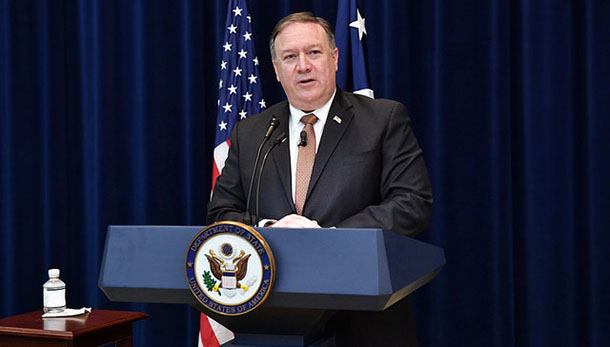Washington, DC — The US should express publicly that China needs to engage in a meaningful and direct dialogue with His Holiness the Dalai Lama or his representatives, without preconditions, to lower tensions and resolve differences, Secretary of State Mike Pompeo has told lawmakers, ahead of his visit to China.
The Chinese government officials and His Holiness the Dalai Lama or his representatives have not met in formal negotiations since 2010. The US has encouraged both sides to engage in meaningful and direct dialogue, without preconditions, to lead to a settlement that resolves differences.
In response to written questions from Members of the US Senate Foreign Relations Committee, Pompeo said he was committed to press for respect of human rights for Tibetans, including freedom of religion and belief, in his conversations with the Chinese officials, and advocating for the release of Tibetan political prisoners.
Secretary Pompeo will visit China from June 14, 2018 and will exchange views with his Chinese counterpart on bilateral ties and major global and regional issues of common concern , Foreign Ministry spokesman Geng Shuang said on Wednesday.
"I will recommend that the United States express publicly, and at the highest levels of government that Chinese authorities need to engage in meaningful and direct dialogue with the Dalai Lama or his representatives, without preconditions, to lower tensions and resolve differences," Secretary Pompeo said.
Pompeo said he will also raise concerns about the lack of regular access to the Tibetan Autonomous Region (TAR) for US journalists, diplomats, academics and others.
The written answers to the questions were submitted by Pompeo as part of his confirmation process. These answers were recently released by the Senate Foreign Relations Committee.
The top American diplomat assured the lawmakers that he will fully implement the Tibetan Policy Act and in particular "will urge China to cease restrictions on the human rights of Tibetans as well as their religious, linguistic and cultural traditions and practices.
"I will be committed to pressing for respect for human rights, including freedom of religion and belief, in my conversations with Chinese officials, and advocating for the release of Tibetan political prisoners," he said.
On the issue of the Chinese government's interference on religious freedom and the reincarnation process of the Dalai Lama, Pompeo committed himself to "press the Chinese government to respect the legitimacy of Tibetan Buddhists' religious practices. This includes the decisions of Tibetan Buddhists in selecting, educating, and venerating the lamas who lead the faith, such as the Dalai Lama," he said.
In its latest Tibet negotiations report sent to the Congress, the Trump administration said it was concerned by the Chinese government's interference in the selection, education and veneration of Tibetan Buddhist religious leaders.
The Chinese Communist regime began their invasion of Tibet in 1949, reaching complete occupation of the country in 1959. Since that time, more than 1.2 million people, 20% of the nation's population of six million, have died as a direct result of China's invasion and occupation. In addition, over 99% of Tibet's six thousand religious monasteries, temples, and shrines, have been looted or decimated resulting in the destruction of hundreds of thousands of sacred Buddhist scriptures.


![Tibet has a rich history as a sovereign nation until the 1950s when it was invaded by China. [Photo: File]](/images/stories/Pics-2024/March/Tibet-Nation-1940s.jpg#joomlaImage://local-images/stories/Pics-2024/March/Tibet-Nation-1940s.jpg?width=1489&height=878)
















